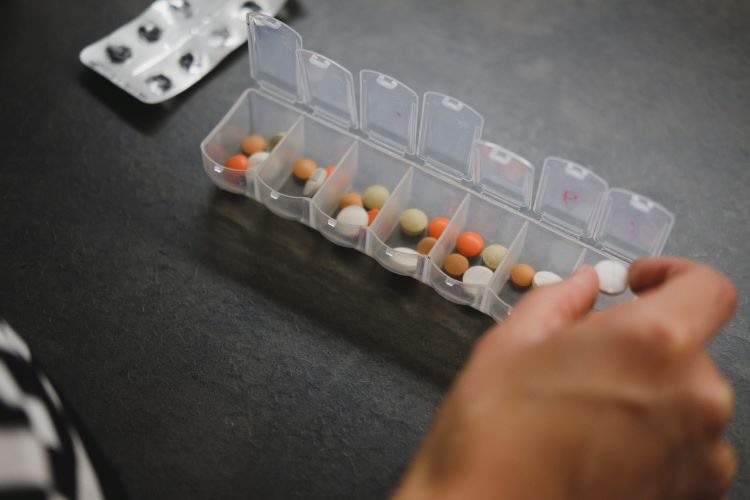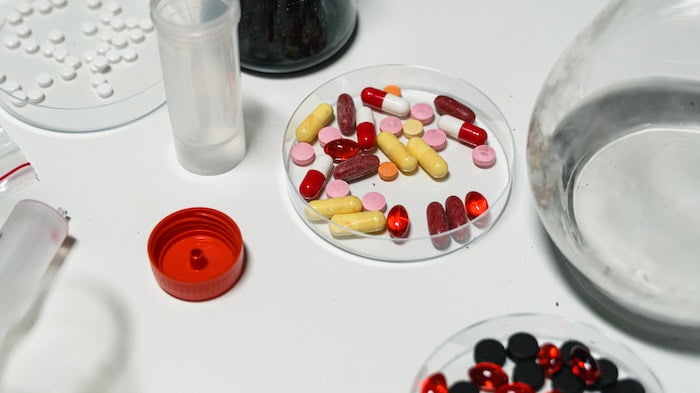Sleeping Pill Overdose Risk
Sleeping pills are medicines that help people to fall asleep and reduce the risk of waking during the night.
The label ‘sleeping pills’ refers to any drug that has hypnotic, soporific, or sedative effects. They are sometimes known as ‘sedative hypnotics’.
Hypnotic drugs are medications that emulate natural sleep’s impact on the central nervous system. [1]
Soporific drugs are medications that help to develop and regulate sleep patterns. [2]
Sedative drugs are medications that impact the central nervous system with more strength than hypnotic drugs. [3]
This means that sleeping pills are psychoactive drugs, as they affect the way in which the brain functions.
Why are Sleeping Pills Usually Prescribed?

Medical professionals in the UK can prescribe sleeping pills to patients if they believe it would positively benefit their quality of life.
It is possible for you to be prescribed sleeping pills by the following healthcare providers:
- doctor or general practitioner
- consultant or psychiatrist
- pharmacist
Sleeping pills are usually prescribed for two main reasons:
- to treat symptoms of insomnia, trouble sleeping, or other sleep disorders
- to treat symptoms of anxiety, intense nerves and stress
How Do Sleeping Pills Work?

Whilst all sleeping pills work to create or increase feelings of drowsiness, the different kinds of sleeping pills all achieve these effects in different ways.
Different Types of Sleeping Pills

As ‘sleeping pills’ is an umbrella term, there are lots of different kinds of sleeping pills that can be prescribed depending on the situation of the individual.
The main types of sleep aid medications are:
- antidepressants
- benzodiazepines
- over-the-counter medications
1. Antidepressants
Antidepressants are medications that are usually prescribed to assist patients with mood regulation.
They work by helping the brain to increase the activity of neurotransmitters (chemicals in the brain) that are associated with emotions.
There are many different kinds of antidepressants, that tend to fit into three different categories:
- Selective serotonin reuptake inhibitors (SSRIs)
- Selective serotonin noradrenaline reuptake inhibitors (SNRIs)
- Tricyclic antidepressants (also known as TCAs) [4]
Antidepressants are available via prescription.
2. Benzodiazepines
Benzodiazepines are known as depressant drugs that work by slowing down the speed at which the messages between the body and the brain travel.
For this reason, they are sometimes known as sedatives and are commonly prescribed to treat anxiety, insomnia, and other sleep disorders. [5]
There are also three different kinds of benzodiazepines. These are:
- short-acting benzodiazepines
- intermediate benzodiazepines
- long-acting benzodiazepines [6]
Benzodiazepines are largely prescription medications, however, ‘street benzos’ can be purchased, although this carries a large risk.
4. Over-the-counter medications
Over-the-counter sleeping pills are any kind of non-prescription sleeping pills.
Most over-the-counter sleeping pills contain ingredients that cause feelings of drowsiness. A common example is antihistamines (usually used to treat allergies).
It is not advised to use these kinds of medications regularly, as tolerance to them can build up quickly. [7]
How Common is Sleeping Pill Use?

A study ran by the University of Warwick’s medical school found that in the UK, over 14 million prescriptions for various sleeping pills (including benzodiazepines) were given in 2017. [8]
It is common for different kinds of treatments to be trialled before sleeping medicines are prescribed.
In the UK, if you have accessed forms of psychological support and are still struggling with symptoms, then a sleeping pill prescription may be the next option.
Side Effects of Sleeping Medications

It is very important to speak with your doctor about the potential side effects your specific medication may cause.
Always read any information leaflets you receive with your medication to ensure you are aware of what you may expect.
As there are many different drugs that can be prescribed and used to impact sleep cycles, it is not possible to list all the side effects there may be.
Here are some common examples of what types of effects can be experienced:
Physical Effects of Sleeping Medications
- allergic reactions
- feeling dizzy
- feeling drowsy
- feeling lightheaded
- sickness or nausea
- change in heartbeat
- change in weight – loss or gain
- difficulty regulating bowel movements – diarrhoea or constipation
- pain in the stomach
- a dry mouth
- walking, talking, eating, or driving in sleep
- headaches
- issues with balance
Psychological Effects of Sleeping Medications
- feeling ‘fuzzy’ or dazed the day after using medication
- changes in memory – struggling to remember and/or recall things
- feeling agitated, annoyed, or easily frustrated
- experiencing hallucinations (seeing, hearing, smelling, tasting or feeling things that others cannot)
- increased risk of suicidal thoughts
- strange or difficult dreams
Is there an Overdose Risk?

Like with all medications, there is a risk of overdose with sleeping medications. However, due to the chemical makeup of sleeping pills, this risk is relatively low.
There are two types of overdoses:
- accidental overdose
- intentional overdose
The first type is an accidental overdose.
This is when an individual takes too much medication unintentionally.
By following the instructions on the medication carefully, you can mitigate this risk.
The second type is an intentional overdose.
This occurs when an individual takes an excessive amount of medication purposefully. This is usually due to experiencing suicidal thoughts.
If you or someone you know are experiencing suicidal thoughts, it is important to access support immediately.
How Do I Take Sleeping Pills Safely?

The best way to take medicines safely is to ask an appropriate medical professional any specific questions you may have and read any leaflets you are provided with.
But, in general, there are some circumstances where you may wish to be extra careful when using sleep medications.
In these circumstances, it is important your doctor is aware if you are dealing with any of the following:
- if you are pregnant [9]
- if you are breastfeeding [10]
- if you are elderly [11]
- if you have (or have a history of) seizures [12]
- is you have low blood pressure [13]
- if you have issues with your heart [14]
How Many Sleeping Pills Cause an Overdose?

It is not possible to identify exactly how many sleeping pills cause an overdose.
This is because each kind of sleeping pill – and each person, is different.
Generally, overdosing on sleeping pills is not that common, but in some cases, it can happen:
1. Personal Factors
The way in which a particular medication affects your body can be down to a list of various factors, including:
- your size (height and weight)
- your basal metabolic rate (how quickly your body breaks things down)
- your general health
- how frequently you use the medication
- if you use other drugs (legal or illegal)
- the strength of the drug you have taken
2. Pharmaceutical Factors
Sleeping pills come in many different forms.
Some sleeping pills contain melatonin.
Melatonin is the chemical in the brain associated with sleep. These medications are usually slow-release and often have a lower risk factor.
There are other medications that have synthetic ingredients that either mimic melatonin or help to stimulate its production or release.
These medications often have faster-acting agents and can have greater effects on the mind and body. [15]
3. Benzodiazepine Overdose
It is rare to overdose on benzodiazepines on their own but is not uncommon for individuals to overdose when taking them with other drugs, such as opioids.
4. Melatonin Overdose
It is not possible to overdose on melatonin alone. Whilst the patient may experience some physical and psychological side effects, there is a very low risk of overdosing with serious medical risks.
5. Antidepressant Overdose
Research has shown that antidepressants are involved in 20% of all suicides by poisoning in the UK. [16]
Sleeping Pill Facts: Overdose Risk Factors

There are various factors that can increase the risk of overdose.
These can include:
- drug interaction due to the mixing of drugs (this is a risk with both legal and illicit drugs)
- tolerance (how used your body is to the specific drugs)
- the strength of drugs, and how commonly you take them
- age
- if you have pre-existing difficulties with your liver and/or lungs
- taking medication alone
- your general health status
- previous overdose history [17]
Sleeping Pill Facts: Overdose Symptoms

Psychological Symptoms of Overdose
- feeling confused
- feeling agitated or annoyed
- feeling paranoid
- hallucinations (seeing, hearing, smelling, feeling or tasting things that are not there)
Physical Symptoms of Overdose
- pain and cramping in the stomach
- pain in the chest
- feeling dizzy or off balance
- feeling sick and vomiting
- feeling drowsy
- struggling to move in a coordinated manner
- strained or difficult breathing
- diarrhoea
- limpness
- seizures
- unclear or slurred speech
- blue tinged nails
- being unable to respond
- making ‘gurgling’ noises in the throat or chest
- appearing pale [18]
Emergency Treatment

Supporting Overdose Patients
If you or a loved one are experiencing any of the above symptoms, it is very important that you access medical attention as soon as possible.
You can do this by calling 999.
There are steps you can take to if you believe you or a loved one has taken an overdose and you are waiting for medical help.
These include:
- if the individual is unconscious and breathing, help them into the recovery position.
- check breathing
- do not provide food or drink to the individual you believe has overdosed
- do not try to cause vomiting
- collect any medication boxes or packets to give to medical staff [19]
What Happens at the Hospital after an Overdose?
1. Admission & Observation
Usually, individuals who have taken an overdose will be admitted to the hospital.
They will have their observations taken to check their general condition.
The primary clinical concerns that staff will have will be around breathing, blood pressure, the heart, and body temperature.
It is likely that patients who have taken an overdose will have their blood taken to check for levels of substances in their system. [20]
2. Treatment
Depending on the type of drug that has been used, and the severity of the overdose, an antidote may need to be used.
An antidote is a drug that neutralises the substance that has been taken and therefore reduces the risk of harm to the body. [21]
It may be necessary for the patient to stay in the hospital for a day or more to ensure they are physically safe.
3. Psychological Assessment
In the UK, if you have presented with overdose symptoms, it is very likely that you will need to speak to a psychiatrist, psychologist, or another mental health professional for an assessment.
This is to check how you are feeling, and what may have caused the overdose. This can help to ascertain if there are treatment options that could be implemented for you to prevent this from happening again.
Sleeping Pill Addiction

It is possible to be addicted to prescription medicines.
This means there is some risk of developing a dependency on prescription sleep aids.
Get Help for Addiction

There are many different forms of support that are specially designed to help individuals gain the tools they need to fight back against addiction.
You may be able to speak about the different options available to you by contacting a medical professional.
1. Detox for Prescription Drugs
If you are experiencing addiction to sleeping medication, it may be beneficial for you to detox from them.
A detox is a process of removing a substance from your body and getting your system used to it not being there anymore.
This can be a productive way to begin a recovery from an addiction to prescription drugs as well as illicit substances.
Once you have detoxed safely, you can turn your attention to your mental well-being.
2. Psychological Support
Sleeping medications are usually prescribed to individuals who suffer from chronic sleep disorders and anxiety.
These symptoms are usually associated with mental health disorders.
That means that your addiction could be a dual diagnosis.
A dual diagnosis is when you are experiencing one or more health conditions at the same time. If you have anxiety and addiction, this is a dual diagnosis.
By speaking with an addiction specialist provider, you can discuss any conditions or diagnoses you may have, and they can help you to use this information to create a treatment plan that will work specifically for you.
Some forms of addiction treatment for example can include:
- Acceptance and Commitment Therapy
- Brief Interventions
- Co-dependency Treatment
- Cognitive Behavioural Therapy (CBT)
- Dialectical Behavioural Therapy (DBT)
- Family Therapy
- Group Therapy
- Holistic Therapy/ Alternative Therapy (Art Therapy, Music Therapy, Equine Therapy, etc).
- Individual Therapy (1-1 Therapy)
- Motivational Enhancement
- Motivational Interviewing
- Psychotherapy
- Twelve-Step Facilitation Treatment (TSF)
- contingency management
- therapeutic communities or self-help groups
Find Support Now
Addiction can feel like an isolating experience, and it can be very tricky to know where to turn for help, support and reassurance.
By finding a support network that works for you, you can get the help that you deserve and begin guided professional treatment with addiction specialist providers.
If you are ready to access support for your use of sleeping pills, you can contact Rehab Recovery at 0800 088 66 86 or use the online form to request a call back from a member of our specialist team about accessing support at a local rehab centre.
If you are uncomfortable with speaking over the phone, you can use our free chat service at any time of day, to speak with a professional virtually.
You can begin your journey to regaining control by speaking with a team of medical professionals all trained to know how best to help you.
References
[1]https://www.researchgate.net/publication/302457838_4_Soporific_Agents_Hypnotics_and_Sedative_Drugs
[2]https://www.researchgate.net/publication/302457838_4_Soporific_Agents_Hypnotics_and_Sedative_Drugs
[3]https://www.researchgate.net/publication/302457838_4_Soporific_Agents_Hypnotics_and_Sedative_Drugs
[4] https://www.ncbi.nlm.nih.gov/books/NBK361016/
[5] https://bjgp.org/content/69/680/152
[6] https://adf.org.au/drug-facts/benzodiazepines/
[7] https://www.ncbi.nlm.nih.gov/pmc/articles/PMC4805417/
[8] https://warwick.ac.uk/newsandevents/pressreleases/prescribing_rates_for/
[9] https://pubmed.ncbi.nlm.nih.gov/25448509/
[10] http://www.breastfeeding-and-medication.co.uk/wp-content/uploads/2019/01/sleeping-tablets-7.pdf
[11] https://www.ncbi.nlm.nih.gov/pmc/articles/PMC6699865/
[12] https://pubmed.ncbi.nlm.nih.gov/22378657/
[13] https://www.ncbi.nlm.nih.gov/pmc/articles/PMC5662388/
[14] https://www.ncbi.nlm.nih.gov/pmc/articles/PMC5662388/
[15] https://www.nccih.nih.gov/health/melatonin-what-you-need-to-know
[16] https://www.ncbi.nlm.nih.gov/pmc/articles/PMC2862059/
[18] https://www.betterhealth.vic.gov.au/health/healthyliving/drug-overdose
[19] https://www.betterhealth.vic.gov.au/health/healthyliving/drug-overdose
[20] https://bnf.nice.org.uk/treatment-summaries/poisoning-emergency-treatment/#overview
[21] https://www.drugs.com/drug-class/antidotes.html




